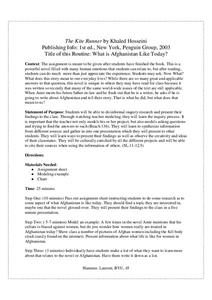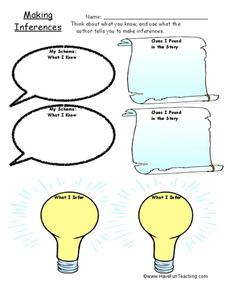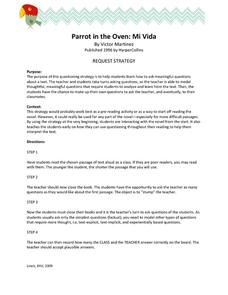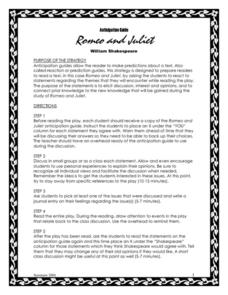Curated OER
The Kite Runner: What is Afghanistan Like Today?
After completing Khaled Hosseini's The Kite Runner, readers research a topic of interest and prepare a five-minute presentation, and share their findings with the class.
E Reading Worksheets
Character Traits and Motivations
Middle schoolers use this guided reading instructional activity to identify the traits and motivations of characters in an assigned text.
Novelinks
The Hitchhiker’s Guide to the Galaxy: Herber Readiness Activity
What does it mean to be alone and isolated? What would you do if you were all alone in a strange place? Kids ponder these questions as they prepare to read Douglas Adams' The Hitchhiker's Guide to the Galaxy.
Novelinks
Nightjohn: Anticipation Guide
Set the stage for Nightjohn, Gary Paulsen's young adult novel about slavery set shortly before the Civil War, by asking readers to indicate whether they agree or disagree with several statements that are connected to issues raised by the...
Have Fun Teaching
Making Inferences (17)
Here's a bright inference worksheet that can enlighten the study of any text. Readers fill in a thought bubble with what they know about a story, then map on a scroll clues they found in the text, and record their insights on the...
Novelinks
The House on Mango Street: List-Group-Label
Encourage close reading of the text and a focus on how Sandra Cisneros' develops her characters with an activity that asks teams to sort, group, and label character descriptions from The House on Mango Street.
Novelinks
The House on Mango Street: Discussion Web
As part of a final discussion of The House on Mango Street, groups examine a concept question about the text, record arguments for and opposed to the question, and then a draw their own conclusions.
Novelinks
The Book Thief: The Power and Influence of Words
To culminate a study of Markus Zusak's The Book Thief, individuals craft a persuasive essay in which they assume the voice of a member of one of the political parties during the early 1920s, and advocate that their party offers the best...
Novelinks
The Book Thief: Cubing Strategy
Whether used to review prior to a reading assessment or as a way to generate ideas for an essay, this activity is sure to encourage critical thinking about Markus Zusak's The Book Thief. Kids create a six-sided question cube with each...
Curated OER
Running Out Of Time: Bloom’s Taxonomy Mixed with QAR
Dig into chapter 19 of Running Out of Time with questions covering each level of Bloom's Taxonomy. Learners read the text, respond to the questions in paragraph form, and then discuss the answers as a class.
Aladdin Paperbacks
Running Out of Time: The Cloze Procedure
Determine if the reading level of Running Out of Time is too easy, to difficult, or just right for your pupils with a cloze reading exercise. After listening to the teacher read the passage, learners fill in the blanks on the cloze...
Curated OER
Paradise Lost: Anticipation Guide
To set the stage for reading Paradise Lost, class members compete an anticipation guide containing statements that connect to themes in Milton's epic poem.
Curated OER
The Color Purple: K-W-H-L Strategy
Learners can chart what they know, what they would like to know, how they plan to learn, and what they have learned from Alice Walker's The Color Purple. Using questions about women's rights, kids study the themes of the novel and think...
Novelinks
The Crucible: Questioning Strategies Bloom's Taxonomy
Enrich your unit on Arthur Miller's The Crucible with a list of reading questions based on Bloom's Taxonomy. Kids answer questions and provide context for the knowledge, comprehension, application, analysis, synthesis, and evaluation...
Curated OER
The Outsiders: Directed Reading Thinking Activity
It can be difficult to begin a novel when you don't know what it's about. Take the opportunity to begin S.E. Hinton's The Outsiders slowly, making predictions and answering questions about the book's first nine pages.
Curated OER
The Outsiders: Anticipation Guide
The Outsiders by S.E. Hinton is always a favorite for middle and high school readers because it addresses issues that hit home to them, decades after the book is set. Have learners fill out an anticipation guide that encourages them to...
Curated OER
Hoot: Bloom's Taxonomy- Questioning Strategy
What better way to examine a text than to ask your own questions? Use Bloom's taxonomy to guide kids through Carl Hiaasen's Hoot by asking questions based on knowledge, comprehension, application, analysis, synthesis, and evaluation.
Novelinks
The Grapes of Wrath: Vocabulary Activity
Readers locate unfamiliar words in John Steinbeck's The Grapes of Wrath and teach these words and their meanings to class members.
Curated OER
Parrot in the Oven: Request Strategy
Victor Martinez's Parrot in the Oven: Mi Vida is used in an activity that models how to develop questions to aid in comprehension of a text.
Curated OER
Crossword Puzzle for Harry Potter and the Chamber of Secrets
Chapter 10 of J.K. Rowling's Harry Potter and the Chamber of Secrets holds a cache of words perfect for this crossword. Learners read the definitions and write in the correct words.
Brigham Young University
K-W-H-L for Harry Potter and the Chamber of Secrets
To prepare for a study of Harry Potter and the Chamber of Secrets, the second in the series of seven books about J.K. Rowling's amazing young wizard, readers complete a K-W-H-L chart.
Brigham Young University
Bloom’s Taxonomy: Questions for Harry Potter and the Chamber of Secrets
As part of their study of Harry Potter and the Chamber of Secrets, readers respond to a series of questions based on chapter eight of J.K. Rowling's second novel in the series about the famous young wizard.
Novelinks
Romeo and Juliet: Anticipation Guide
To prepare readers for some of the themes in Shakespeare's Romeo and Juliet, individuals complete an anticipation guide and then share their ideas in small groups.
Curated OER
Out of the Dust: Questioning Strategies
Bloom's Taxonomy is a great way to address the many levels of comprehension. With explanations and examples of each level, you can create questions that focus on knowledge, comprehension, application, analysis, synthesis, and evaluation.

























